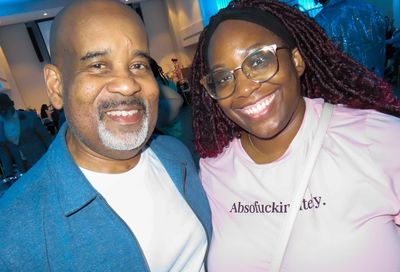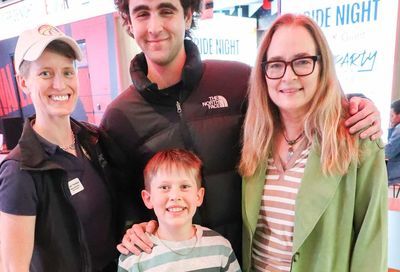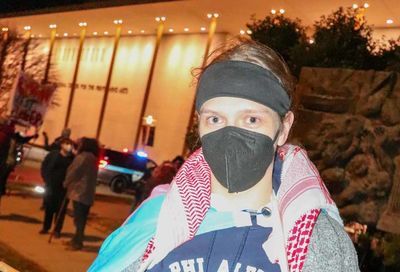University of Maryland, College Park tops list of “Best Colleges for LGBTQ+ Students”
The list ranks colleges on inclusion, support services, academic life, and affordability
By John Riley on July 18, 2020 @JRileyMW

The University of Maryland, College Park tops the list of “Best Colleges for LGBTQ+ Students,” while the University of Virginia comes in at No. 6.
The list was compiled as part of a collaboration between BestColleges, a national organization focused on ranking colleges based on various factors to help inform prospective students about colleges that will suit their educational goals, and Campus Pride, a nonprofit dedicated to supporting programs and services to create safer, more LGBTQ-affirming environments on college campuses.
For the list of “Best Colleges for LGBTQ+ Students,” BestColleges’ rankings take into account factors like affordability, including the cost of tuition and housing, available financial aid, academic reputation, and campus size, and combine them with the universities’ Campus Pride Index score.
The Campus Pride Index is a way of measuring a school’s LGBTQ atmosphere and environment, taking into account a number of factors relating to LGBTQ inclusion, such as the presence of anti-harassment policies, gender-inclusive housing for transgender students, nondiscrimination policies, and counseling or mental health offerings for LGBTQ students. The index rates colleges on a five-star scale.
But to land on BestColleges’ list, an institution must have at least a three-and-a-half star rating from Campus Pride, which would be a “bare minimum” before a school can even be ranked, according to Quinn Tomlin, the public relations manager for BestColleges.
“What we do for our ranking is we work with Campus Pride by taking their score, which is half of the weight, and then, using our traditional methodology, which is a combination of academic and affordability,” Tomlin told Metro Weekly in an interview.
“We know education and academics, but we’re not the end-all, be-all experts on the LGBTQ community. So we want to go to the source and work with Campus Pride and have them as a resource.
“For the other half of our rankings, we look at a combination of factors like admission rate, graduation rate, and are students able to get a degree in a reasonable time? We look at the retention rate: are students able to stay in school? And then affordability, which we think is really important. You know, what is the actual tuition?”
Tomlin adds: “Then we look at student loan default rates, [to see whether] students who earn a degree actually able to pay it back, and how many students are having to take out loans. We want to make sure we’re giving a holistic view of not only the most exclusive and LGBTQ+ friendly space, but also, you know, throwing in that layer of academic quality and affordability.”
Tomlin notes that BestColleges previously partnered with Campus Pride to launch a list of the best college in every state in order to cater to students who don’t have the opportunity or the money to travel out-of-state for college but may be able to take advantage of more affordable options without sacrificing school quality or a welcoming, affirming atmosphere.
“I think affordability is important because a school can be amazing. But if a student can’t afford to go there, you know, then how how great is it?” Tomlin says. “So we want to make sure that students are not going to be putting a good return on investment for their degree, which is partly why for them that we’re looking at low default rates.
“That is one of our largest metrics, because that indicates, after students are graduating with their degree, whether they are they able to pay it off. We don’t want to be sending students to schools that aren’t giving them the return on investment.”
See also: Federal lawmakers reintroduce bill to protect LGBTQ college students from harassment
Shane Windmeyer, the founder and executive director of Campus Pride, notes that his organization releases two lists each year, one focusing on the “Best of the Best” colleges for LGBTQ people — released in August or September of each year, when classes generally resume — and the BestColleges ranking taking into account cost, affordability, and academics.
“Three years ago, we received quite a bit of criticism from the LGBTQ community about how the colleges we are highlighting weren’t affordable,” says Windmeyer. “And I thought that was good criticism. And so we partner with best colleges because they track affordability, they track academics and we basically take a 50/50 split of affordability/academics with LGBTQ progress and inclusion.”
To come up with its own ranking, College Pride has an assessment tool, consisting of 80 or more weighted questions asking schools about their policies, programs, and best practices that deal with or cater to the LGBTQ community.
“We’re not talking about student perception, because there’s no way that Campus Pride can really measure the perception of how students feel without there being a climate study for every college in the country,” says Windmeyer, while also noting that schools are encouraged to do such studies.
“The questions are divided among what we call eight different LGBTQ-friendly factors. And so those are eight parts of the campus community. One of them is support, institutional commitment. Another factor is academic life, then there’s student life, housing and residence life, campus safety, counseling and health, and recruitment and retention efforts. Each of the questions are yes or no, so you either get full points or you get zero points. And each of the questions is weighted.
“So there’s certain questions like ‘Does your campus have a nondiscrimination policy in place that inclusive of sexual orientation?’ Obviously, that is more highly weighted than ‘Does your campus have a fraternity or sorority that is an LGBT organization?’ I bring that up because a lot of people are like, well, this gives maybe a bias toward larger campuses or smaller campuses. And so we weighted the questions in order to keep it somewhat fair to both large and small, four-year public and private institutions.”

According to a study conducted by Campus Pride, about 23% of LGBTQ+ faculty members and students were significantly more likely to experience harassment than their heterosexual peers. In addition, LGBTQ students and faculty members were significantly less likely to feel very comfortable with their environment on-campus.
That’s why Campus Pride places such emphasis on identifying schools with policies designed to protect students from harassment and discrimination and which can be enforced to ensure that campuses are creating safe, welcoming environments for members of the LGBTQ community.
This year’s list begins with the University of Maryland, College Park, which BestColleges notes, in a description, has an LGBT Equity Center designed to support members of the LGBTQ community.
“In addition to general educational and outreach events, this center offers resources specifically for trans students, including mental health services and a guide on changing their legal name,” the description reads.
“As one of the best LGBTQ+ colleges and universities, UMD helps first-year students adjust to campus life through The One Project. This collection of programs includes a welcome social event and a community-building retreat. Students who want to engage in social justice advocacy can join the Lavender Leadership Honor Society.
“UMD’s LGBT Equity Center also delivers internship opportunities, allowing students to gain hands-on experience and course credit by collaborating with organizations like Equality Maryland and the Human Rights Campaign. Additional resources include scholarships and student and faculty awards.”
The other DMV-area institution on the list is the University of Virginia, which lands at the sixth spot on the list of 25 institutions. BestColleges notes that UVA’s LGBTQ Center attempts to foster a welcoming environment and programming that specifically addresses the needs of LGBTQ students.
“Community members benefit from programs like Queer Health Talks and panel discussions centered on topics like safe sex, HIV testing, mental health, and transgender health. Through Safe Space Training, participants engage in a two-hour session to learn about important terminology and how to practice allyship,” the description reads.
“For students who want to get involved, the LGBT Center offers volunteer and internship opportunities. Students can also engage with community groups, like HISE, which advocates for LGBTQ+-inclusive sex education in public schools. Additionally, participants may help publish the Q* Anthology of Queer Culture, an online literary magazine for LGBTQ+ culture.”
To see the full list of institutions, visit www.bestcolleges.com/features/best-colleges-for-lgbt-students.
Read more:
Indiana city councilman apologizes for comments attacking LGBTQ people and Black Lives Matter
Athletic trainer claims she was fired from Indianapolis religious school for being gay
Brazil’s anti-gay president allegedly said masks are for “f****ts.” He now has COVID-19.
[bookshelf id=’2′]
Support Metro Weekly’s Journalism
These are challenging times for news organizations. And yet it’s crucial we stay active and provide vital resources and information to both our local readers and the world. So won’t you please take a moment and consider supporting Metro Weekly with a membership? For as little as $5 a month, you can help ensure Metro Weekly magazine and MetroWeekly.com remain free, viable resources as we provide the best, most diverse, culturally-resonant LGBTQ coverage in both the D.C. region and around the world. Memberships come with exclusive perks and discounts, your own personal digital delivery of each week’s magazine (and an archive), access to our Member's Lounge when it launches this fall, and exclusive members-only items like Metro Weekly Membership Mugs and Tote Bags! Check out all our membership levels here and please join us today!
The Magazine
-
Most Popular
 Gay Army Reserve Officer in Uniform Sex Video Scandal
Gay Army Reserve Officer in Uniform Sex Video Scandal  Charges Dropped in Nancy Mace Assault Case
Charges Dropped in Nancy Mace Assault Case  Jared Polis Signs Law Repealing Colorado's Gay Marriage Ban
Jared Polis Signs Law Repealing Colorado's Gay Marriage Ban  WorldPride Warns International Trans Visitors About Travel Risks
WorldPride Warns International Trans Visitors About Travel Risks  Awesome Con Gallery: Rage Gear Studios
Awesome Con Gallery: Rage Gear Studios  'Porn Star University' Started by Gay-for-Pay Creator Andy Lee
'Porn Star University' Started by Gay-for-Pay Creator Andy Lee  Hugh Bonneville Delivers a Show-Stopping Vanya
Hugh Bonneville Delivers a Show-Stopping Vanya  White House Demands NIH Study Transgender Transition "Regret"
White House Demands NIH Study Transgender Transition "Regret"  Transgender Blackhawk Pilot Sues Right-Wing Influencer
Transgender Blackhawk Pilot Sues Right-Wing Influencer  Air Force Reverses Ban on Pronouns in Email Signatures
Air Force Reverses Ban on Pronouns in Email Signatures
 Jared Polis Signs Law Repealing Colorado's Gay Marriage Ban
Jared Polis Signs Law Repealing Colorado's Gay Marriage Ban  White House Ignores Reporters with Pronouns in Email Signatures
White House Ignores Reporters with Pronouns in Email Signatures  White House Demands NIH Study Transgender Transition "Regret"
White House Demands NIH Study Transgender Transition "Regret"  Air Force Reverses Ban on Pronouns in Email Signatures
Air Force Reverses Ban on Pronouns in Email Signatures  Transgender Blackhawk Pilot Sues Right-Wing Influencer
Transgender Blackhawk Pilot Sues Right-Wing Influencer  'cullud wattah' is a Compelling Drama About Flint's Toxic Water
'cullud wattah' is a Compelling Drama About Flint's Toxic Water  Gay French Thriller 'Misericordia' is Creepy and Suspenseful
Gay French Thriller 'Misericordia' is Creepy and Suspenseful  Hugh Bonneville Delivers a Show-Stopping Vanya
Hugh Bonneville Delivers a Show-Stopping Vanya  This Week's Advertisers: Rep. Becca Balint - April 10, 2025
This Week's Advertisers: Rep. Becca Balint - April 10, 2025  WorldPride Warns International Trans Visitors About Travel Risks
WorldPride Warns International Trans Visitors About Travel Risks
Scene
Metro Weekly
Washington's LGBTQ Magazine
P.O. Box 11559
Washington, DC 20008 (202) 638-6830
About Us pageFollow Us:
· Facebook
· Twitter
· Flipboard
· YouTube
· Instagram
· RSS News | RSS SceneArchives
Copyright ©2024 Jansi LLC.







You must be logged in to post a comment.